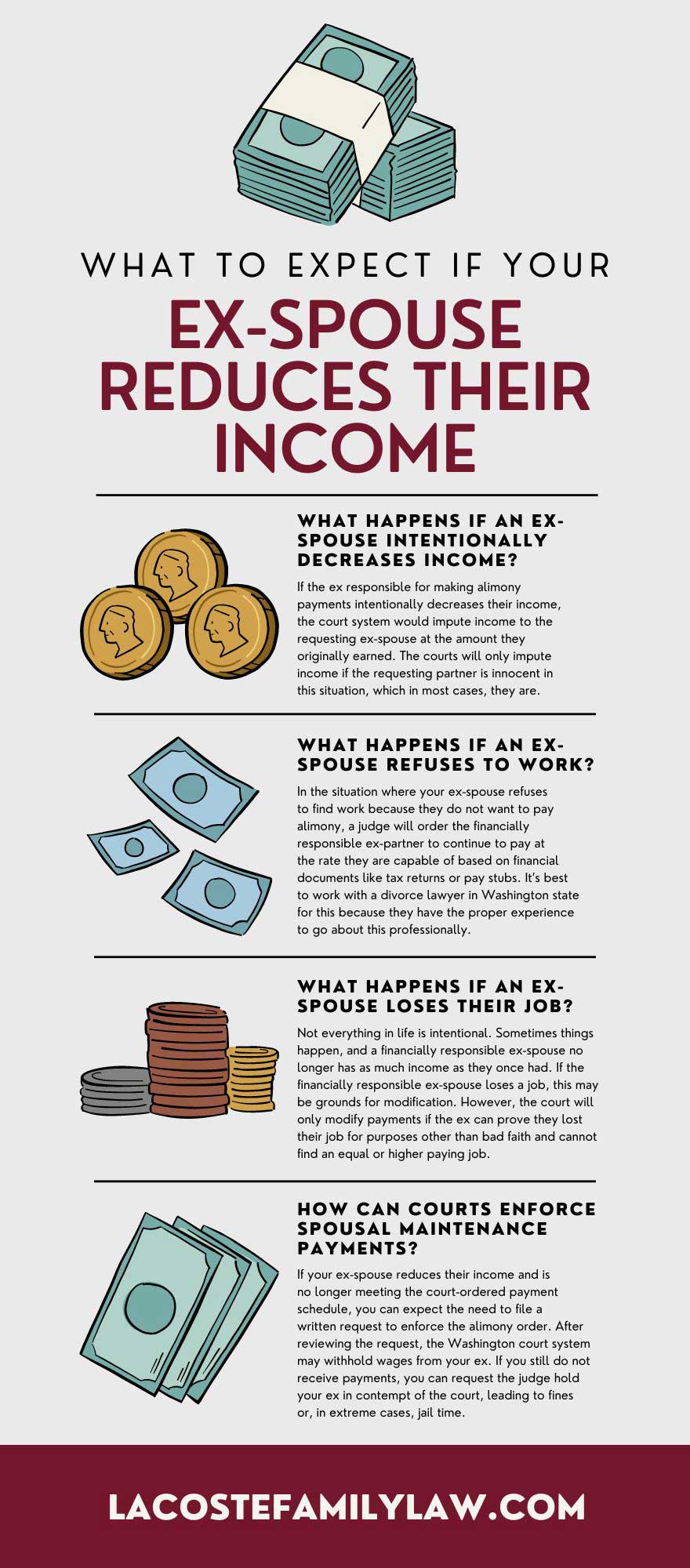
25 Apr What To Expect if Your Ex-Spouse Reduces Their Income
When the court initially orders alimony payments, they expect the financially responsible ex-spouse to pay the lesser-earning ex until the court order expires. However, some circumstances arise where an ex can no longer meet the court’s expectations to make alimony payments. But what does that mean for the partner who relies on these monthly payments to live?
When your ex-spouse reduces their income—whether on purpose or involuntarily—there are several things you can expect. In this article, we go over the normal expectations for spousal maintenance, how Washington state handles alimony orders, what factors affect modifications, what to expect in various scenarios, and how LaCoste Family Law can be of service in this situation.
What Are the Average Spousal Maintenance Norms?
When a court needs to determine how much money to allocate to spousal maintenance, it depends on the length of the marriage, the requesting spouse’s need for maintenance, and the other spouse’s ability to pay this.
For short-term marriages, Washington courts will typically award the lesser-earning spouse enough money for basic everyday needs until they are in the same place financially before the marriage, or until they can get back on their feet. Long-term marriages generally have a complex formula, based on years married, agreements between the parties, and the current financial picture of both people. Both short and mid-length marriage monthly payments typically taper off as the months go by. However, for long-term marriages longer than 25 years, the maintenance should be enough to equalize both partners’ economic positions for multiple years, if not for life.
Washington Is a “No Fault” Divorce State
Washington is a “no-fault” divorce state, meaning the courts cannot punish one spouse for causing a divorce and failing to live up to the marriage agreement. To understand this better, in “at-fault” states, the courts could decide to decrease the amount of alimony to a lesser-earning spouse if they were the cause for divorce. For example, an ex who caused the divorce by cheating may not receive alimony or spousal maintenance at all due to being “at fault” in the divorce.
Because Washington is the opposite, the courts cannot minimize maintenance payments solely because one spouse is at fault for the divorce over the other. However, this does not mean the court ignores wrongdoing. If an ex purposefully decreases their income to avoid paying maintenance, it can result in consequences.
Factors That Could Cause Spousal Maintenance Modifications
Several factors could cause the court to modify spousal maintenance. If any of these factors affect the ex-spouse paying support, they may be entitled to a decrease in alimony payments.
- The ex-spouse’s health and ability to obtain employment
- A substantial change in financial circumstances
- Disability or unforeseen medical expenses
- Any other factor the court deems relevant
When the modification is involuntary, or your ex has proven their financial circumstance is due to something out of their control, the court can impute your loss of alimony payments. However, the court will need proof to modify any payments.
What Happens if an Ex-Spouse Intentionally Decreases Income?
If the ex responsible for making alimony payments intentionally decreases their income, the court system would impute income to the requesting ex-spouse at the amount they originally earned. The courts will only impute income if the requesting partner is innocent in this situation, which in most cases, they are.
However, there are other ways the courts can get you the money you’re owed. In another scenario, Washington court systems may order disproportionate rewards for the ex-spouse’s properties. For instance, if the ex-spouse responsible for payments secretly hid money and avoided payments, the court could award the innocent party assets to compensate for the deceitful party’s wrongdoing.
What Happens if an Ex-Spouse Refuses To Work?
In the situation where your ex-spouse refuses to find work because they do not want to pay alimony, a judge will order the financially responsible ex-partner to continue to pay at the rate they are capable of based on financial documents like tax returns or pay stubs. It’s best to work with a divorce lawyer in Washington state for this because they have the proper experience to go about this professionally.
What Happens if an Ex-Spouse Loses Their Job?
Not everything in life is intentional. Sometimes things happen, and a financially responsible ex-spouse no longer has as much income as they once had. If the financially responsible ex-spouse loses a job, this may be grounds for modification. However, the court will only modify payments if the ex can prove they lost their job for purposes other than bad faith and cannot find an equal or higher paying job.
What does this mean for the lesser-earning partner who still needs these alimony payments to live comfortably? If the earning ex-spouse proves they cannot find a job of equal pay, the court can review and potentially modify the owed support.
How Can Courts Enforce Spousal Maintenance Payments?
If your ex-spouse reduces their income and is no longer meeting the court-ordered payment schedule, you can expect the need to file a written request to enforce the alimony order. After reviewing the request, the Washington court system may withhold wages from your ex. If you still do not receive payments, you can request the judge hold your ex in contempt of the court, leading to fines or, in extreme cases, jail time.
LaCoste Family Law Firm
There could be several reasons why your ex-spouse is reducing their income. It could be voluntary or involuntary. Regardless, you will need a legal team to help with court orders and to ensure you receive the money you’re owed. Our law firm focuses on our clients and their needs because this ultimately affects your daily life. To meet our client’s expectations, we go the extra mile. When you’re in a situation where an ex reduces their income, give us a call!
Understanding what could happen if your ex-spouse reduces their income can help better prepare you for how to handle the situation. What the court orders for spousal support maintenance at the beginning of the divorce is a legal obligation. You cannot modify or reduce payments independently; it must go through the Washington courts. If the time comes, LaCoste Family Law is here to help you!


